
David Warren Brubeck was an American jazz pianist and composer. Often regarded as a foremost exponent of cool jazz, Brubeck's work is characterized by unusual time signatures and superimposing contrasting rhythms, meters, and tonalities.
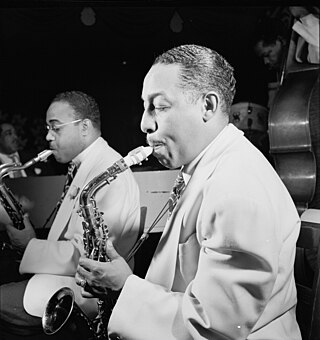
John Cornelius "Johnny" Hodges was an American alto saxophonist, best known for solo work with Duke Ellington's big band. He played lead alto in the saxophone section for many years. Hodges was also featured on soprano saxophone, but refused to play soprano after 1946. Along with Benny Carter, Hodges is considered to be one of the definitive alto saxophone players of the big band era.

Joseph Albert Morello was an American jazz drummer best known for serving as the drummer for pianist Dave Brubeck, as part of the Dave Brubeck Quartet, from 1957 to 1972, including during the quartet's "classic lineup" from 1958 to 1968, which also included alto saxophonist Paul Desmond and bassist Eugene Wright. Morello's facility for playing unusual time signatures and rhythms enabled that group to record a series of albums that explored them. The most notable of these was the first in the series, the 1959 album Time Out, which contained the hit songs "Take Five" and "Blue Rondo à la Turk". In fact, "Take Five", the album's biggest hit was specifically written by Desmond as a way to showcase Morello's ability to play in 5
4 time.
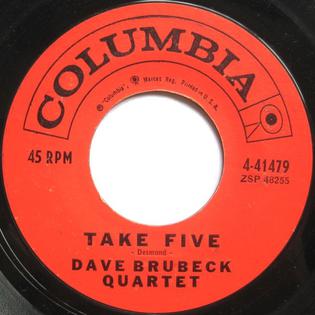
"Take Five" is a jazz standard composed by Paul Desmond. It was first recorded in 1959 and is the third track on Time Out by the Dave Brubeck Quartet. Frequently covered by a variety of artists, the track is the biggest-selling jazz song of all time and a Grammy Hall of Fame inductee.

"C Jam Blues" is a jazz standard composed in 1942 by Duke Ellington and performed by countless other musicians, such as Dave Grusin, Django Reinhardt, Oscar Peterson, and Charles Mingus.
Joseph Rupert Benjamin was an American jazz bassist.

Time Further Out is a jazz studio album by the Dave Brubeck Quartet released by Columbia Records in November 1961. It features the "classic" lineup of the quartet: pianist and leader Dave Brubeck, alto saxophonist Paul Desmond, bassist Eugene Wright, and drummer Joe Morello. The album was recorded by engineer Fred Plaut and produced by Teo Macero.
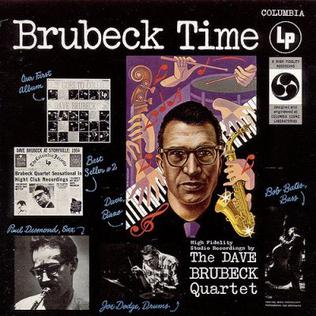
Brubeck Time is a jazz album by The Dave Brubeck Quartet, a rare studio recording from that period of the band, when it was recording mostly live albums. It was recorded in the fall of 1954, and originally released in 1955 under the Columbia label as CL 622. In 1968, Columbia re-channeled the album for stereo and re-released it as Instant Brubeck under the Harmony label as HS 11253. It was later re-released again on CD in 1991 under the title Interchanges '54 as CK 47032, with the addition of four tracks from Jazz: Red Hot and Cool.

Bernstein Plays Brubeck Plays Bernstein is a 1961 studio album by The Dave Brubeck Quartet. Its title refers to the fact that it consists of both a Brubeck composition conducted by Leonard Bernstein and Bernstein compositions played by the Dave Brubeck Quartet. The title is also an echo of Dave Brubeck's 1956 solo debut album, Brubeck Plays Brubeck.

Live at the Berlin Philharmonie is a 1970 live album by Dave Brubeck and his trio with Gerry Mulligan recorded at the Berlin Philharmonie. It was reissued in 1995 with several bonus tracks. The album peaked at 21 on the Billboard Top Jazz Charts.
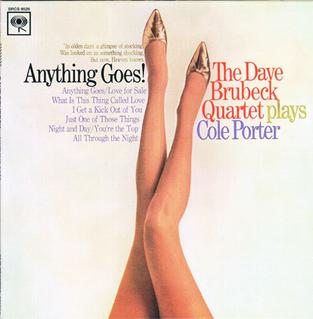
Anything Goes! The Dave Brubeck Quartet Plays Cole Porter is a 1967 studio album by Dave Brubeck and his quartet of music by Cole Porter, recorded between December 8, 1965 and February 17, 1966.
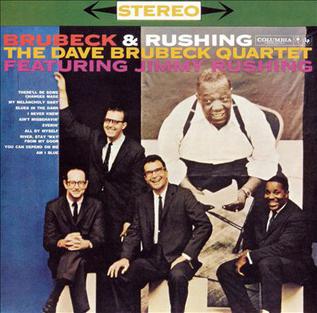
Brubeck and Rushing is a 1960 album by The Dave Brubeck Quartet and the singer Jimmy Rushing.

Brubeck in Amsterdam is a 1962 live album by Dave Brubeck and his quartet recorded on 3 December at the Concertgebouw in Amsterdam, though unreleased until 1969. Six of the tracks are from Brubeck's musical The Real Ambassadors.

Bravo! Brubeck! is a 1967 live album by Dave Brubeck and his quartet, recorded during their tour of Mexico. The quartet were augmented by Chamin Correa on guitar, and the bongo and conga player Salvatore Agueros. It was released in 1967.
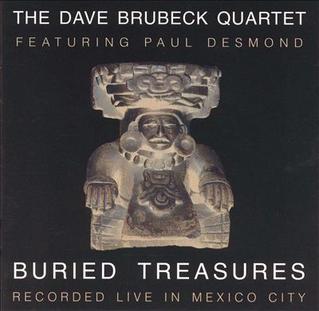
Buried Treasures is a 1967 live album by Dave Brubeck and his quartet, recorded during their tour of Mexico. It was released in 1998. A second live album recorded on their tour, Bravo! Brubeck!, was released in July 1967.
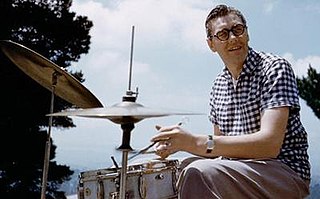
Joseph George Dodge was an American jazz musician.

Jazz: Red Hot and Cool is a jazz live album by The Dave Brubeck Quartet. It was recorded during one 1954 and two 1955 performances at the Basin Street East club in New York City. Released originally in 1955, this album was remastered and reissued in 2001, while adding two tracks that were not included in the original album.

The Dave Brubeck Quartet in Europe is a live album by pianist Dave Brubeck and his quartet recorded in 1958 in Copenhagen, Denmark. The cartoon on the cover of the album of Brubeck and his quartet was drawn by Arnold Roth.

Jazz Impressions of Eurasia is a studio album by pianist Dave Brubeck and his quartet recorded after, and inspired by, their 1958 world tour sponsored by the American state department during which they played 80 concerts in 14 countries, including Turkey, Iran, Iraq, India, Pakistan, and Afghanistan, over three months. In the liner notes to the album, Brubeck notes that "These sketches of Eurasia have been developed from random musical phrases I jotted down in my notebook as we chugged across the fields of Europe, or skimmed across the deserts of Asia, or walked in the alleyways of an ancient bazaar. ... I tried to create an impression of a particular locale by using some of the elements of their folk music within the jazz idiom." The album was recorded in July and August 1958 at the Columbia 30th St. Studios in New York.

25th Anniversary Reunion is a live album by the Dave Brubeck Quartet recorded in 1976 at the Interlochen Arts Academy in Michigan and released by the Horizon label.



















